2015 年专业英语八级考试真题及答案
MINI-LECTURE
LISTENING COMPREHENSION (35 MIN)
PART I
SECTION A
In this section you will hear a mini-lecture. You will hear the lecture ONCE ONLY. While
listening, take notes on the important points. Your notes will not be marked, but you will
need them to complete a gap-filling task after the mini-lecture. When the lecture is over,
you will be given two minutes to check your notes, and another ten minutes to complete the
gap-filling task on ANSWER SHEET ONE, using no more than three words in each gap. Make sure
the word(s) you fill in is (are) both grammatically and semantically acceptable. You may refer
to your notes while completing the task. Use the blank sheet for note-taking. Now, listen to
the mini-lecture.
Understanding Academic Lectures
Listening to academic lectures is an important task for university students. Then, how can
we comprehend a lecture efficiently?
I. Understand all (1) _______
A. words
B. (2) _______
—stress
—intonation
(3) _______
II. Adding information
A. lectures: Sharing information with audience
B. listeners: (4) _______
C. sources of information
—knowledge of (5) _______
—(6) _______of the world
D. listening involving three steps:
—hearing
—(7) _______
—adding
III. (8) _______
A. reasons
—overcome noise
—save time
B. (9) _______
—content
—organization
IV. Evaluating while listening
A. help to decide the (10)
B. help to remember information
SECTION B
In this section you will hear everything ONCE ONLY. Listen carefully and then answer the
questions that follow. Mark the best answer to each question on ANSWER SHEET TWO.
of notes
INTERVIEW
�
Questions 1 to 5 are based on an interview. At the end of the interview you will be given 10
seconds to answer each of the following five questions. Now listen to the interview.
1. Theresa thinks that the present government is ________.
[A] doing what they have promised to schools
[B] creating opportunities for leading universities
[C] considering removing barriers for state school pupils
[D] reducing opportunities for state school pupils
2. What does Theresa see as a problem in secondary schools now?
[A] Universities are not working hard to accept state school pupils.
[B] The number of state pupils applying to Oxford fails to increase.
[C] The government has lowered state pupils’ expectations.
[D] Leading universities are rejecting state school pupils.
3. In Theresa’s view, school freedom means that schools should ____.
[A]
[B]
[C]
[D]
be given more funding from education authorities
be given all the money and decide how to spend it
be granted greater power to run themselves
be given more opportunities and choices
4. According to Theresa, who decides or decide money for schools at the present?
[A] Local education authorities and the central government.
[B] Local education authorities and secondary schools together.
[C] Local education authorities only.
[D] The central government only.
Throughout the talk, the interviewer does all the following EXCEPT ____.
5.
[A] asking for clarification
[B] challenging the interviewee
[C] supporting the interviewee
[D] initiating topics
NEWS BROADCAST
SECTION C
In this section you will hear everything ONCE ONLY.Listen carefully and then answer the
questions that follow. Mark the best answer to each question on ANSWER SHEET TWO.
Questions 6 and 7 are based on the following news. At the end of the news item, you will be
given 20 seconds to answer the questions. Now listen to the news.
News Item 1
6. What is the main idea of the news item?
[A] Fewer people watch TV once a week.
[B] Smartphones and tablets have replaced TV.
[C] New technology has led to more family time.
�
[D] Bigger TV sets have attracted more people.
News Item 2
7. How many lawmakers voted for the marijuana legalization bill?
[A] 50.
[C] 46.
[B] 12.
[D] 18.
8. The passing of the bill means that marijuana can be________.
[A] bought by people under 18
[B] made available to drug addicts
[C] provided by the government
[D] bought in drug stores
News Item 3
9. What did the review of global data reveal?
[A]Diarrhea is a common disease.
[B]Good sanitation led to increase in height.
[C]There were many problems of poor sanitation.
[D] African children live in worse sanitary conditions.
10. The purpose of Dr. Alan Dangour’s study was most likely to ________.
[A] examine links between sanitation and death from illness
[B] look into factors affecting the growth of children
[C] investigate how to tackle symptoms like diarrhea
[D] review and compare conditions in different countries
A
PART II READING COMPREHENSION (30 MIN)
In this section there are four reading passages followed by a total of 20 multiple-choice
questions. Read the passages and then mark the best answer to each question on ANSWER SHEET
TWO.
TEXT
In 2011, many shoppers chose to avoid the frantic crowds and do their holiday shopping from
the comfort of their computer. Sales at online retailers gained by more than 15%, making it
the biggest season ever. But people are also returning those purchases at record rates, up
8% from last year.
What went wrong? Is the lingering shadow of the global financial crisis making it harder to
accept extravagant indulgences? Or that people shop more impulsively - and therefore make bad
decisions - when online? Both arguments are plausible. However, there is a third factor: a
question of touch. We can love the look but, in an online environment, we cannot feel the quality
of a texture, the shape of the fit, the fall of a fold or, for that matter, the weight of an
earring. And physically interacting with an object makes you more committed.
When my most recent book Brand washed was released, I teamed up with a local bookstore to conduct
an experiment about the differences between the online and offline shopping experience. I
carefully instructed a group of volunteers to promote my book in two different ways. The first
�
was a fairly hands-off approach. Whenever a customer would inquire about my book, the volunteer
would take them over to the shelf and point to it. Out of 20 such requests, six customers
proceeded with the purchase.
The second option also involved going over to the shelf but, this time, removing the book and
then subtly holding onto it for just an extra moment before placing it in the customer's hands.
Of the 20 people who were handed the book. 13 ended up buying it. Just physically passing the
book showed a big difference in sales. Why? We feel something similar to a sense of ownership
when we hold things in our hand. That's why we establish or reestablish connection by greeting
strangers and friends with a handshake. In this case, having to then let go of the book after
holding it might generate a subtle sense of loss, and motivate us to make the purchase even
more.
A recent study also revealed the power of touch, in this case when it came to conventional
mail. A deeper and longer-lasting impression of a message was formed when delivered in a letter,
as opposed to receiving the same message online. Brain imaging showed that, on touching the
paper, the emotional center of the brain was activated, thus forming a stronger bond. The study
also indicated that once touch becomes part of the process, it could translate into a sense
of possession. This sense of ownership is simply not part of the equation in the online shopping
experience.
As the rituals of purchase in the lead-up to Christmas change, not only do we give less thought
to the type of gifts we buy for our loved ones but, through our own digital wish lists, we
increasingly control what they buy for us. The reality, however, is that no matter how convinced
we all are that digital is the way to go, finding real satisfaction will probably take more
than a few simple clicks.
11. According to the author, shoppers are returning their purchases for all the following
reasons EXCEPT that ____.
[A] they are unsatisfied with the quality of the purchase
[B]they eventually find the purchase too expensive
[C] they change their mind out of uncertainty
[D] they regret making the purchase without forethought
12. What is the purpose of the experiment in the bookstore?
[A] To see which promotion method is preferred by customers.
[B]To find out the strengths and weaknesses of both methods.
[C] To try to set up a new retailer-customer relationship.
[D] To see the effect of an approach on customers' decisions.
13. Why does the author cite the study by Bangor University and the Royal Mail Service?
[A]To compare similar responses in different settings.
[B] To provide further evidence for his own observation.
[C] To offer a scientific account of the brain's functions.
[D] To describe emotional responses in online shopping.
14. What can be inferred from the last paragraph?
�
[A]Real satisfaction depends on factors other than the computer.
[B] Despite online shopping we still attach importance to gift buying.
[C] Some people are still uncertain about the digital age.
[D] Online shopping offers real satisfaction to shoppers.
B
Text
My professor brother and I have an argument about head and heart about whether he overvalues
IQ while I learn more toward EQ. We typically have this debate about people—can we be friends
with a really smart jerk(怪物)?—but there’s corollary to animals as well. I’d love it
if our dog could fetch the morning paper and then read it to me over coffee, but I actually
care much more about her loyal and innocent heart. There’s already enough thinking going on
is our house, and we probably spend too much time in our heads, where we need some role modeling
is in instinct, and that’s where a dog is a roving revelation.
I did not grow up with dogs, which meant that my older daughter’s respectful but unyielding
determination to get one required some adjustment on my part. I often felt she was training
me: from ages of 6 to 9, she gently schooled me in various breeds and their personalities,
whispered to the dogs we encountered so they would charm and persuade me, demonstrated by her
self-discipline that she was ready for the responsibility. And thus came our dog Twist, whom
I sometimes mistake for a third daughter.
At first I thought the challenge would be to train her to sit, to heel, to walk calmly beside
us and not go wildly chasing the neighborhood rabbits. But I soon discovered how much more
we had to learn from her than she from us.
If it is true, for example, that the secret to a child’s success is less rare genius than
raw persistence, Twist’s ability to stay on task is a model for us all, especially if the
task is trying to capture the sunbeam that flicks around the living room as the wind blows
through the branches outside. She never succeeds, and she never gives up. This includes when
she runs square into walls.
Then there is her unfailing patience, which breaks down only when she senses that dinnertime
was 15 minutes ago and we have somehow failed to notice. Even then she is more eager than
indignant, and her refusal to whine shows a restraint of which I’m not always capable when
hungry.
But the lesson I value most is the one in forgiveness, and Twist first offered this when she
was still very young. When she was about 7 months old, we took her to the vet to be sprayed(切
除卵巢). We turned her over to a stranger, who proceeded to perform a procedure that was probably
not pleasant, But when the vet returned her to us, limp and tender, there was no recrimination(反
责),no how could you do that to me? It was as though she really knew that we could not
intentionally cause her pain, and while she did not understand, she forgave and curled up with
her head on my daughter’s lap.
I suppose we could have concluded that she was just blindly loyal and docile. But eventually
we knew better. She is entirely capable of disobedience, as she has proved many times. She
will ignore us when there are more interesting things to look at, rebuke us when we are careless,
bark into the twilight when she has urgent messages to send. But her patience with our failings
and fickleness and her willingness to give us a second chance are a daily lesson in gratitude.
�
My friends who grew up with dogs tell me how when they were teenagers and trusted no one in
the world, they could tell their dog all their secrets. It was the one friend who would not
gossip or betray, could provide in the middle of the night the soft, unbegrudging comfort and
peace that adolescence conspires to disrupt. An age that is all about growth and risk needs
some anchors and weights, a model of steadfastness when all else is in flux. Sometimes I think
Twist’s devotion keeps my girls on a benevolent lash, one that hangs quietly at their side
as they trot along but occasionally yanks them back to safety and solid ground.
We’ve weighed so many decisions so carefully in raising our daughters what school to send
them to and what church to attend, when to give them cell phones and with what precautions.
But when it comes to what really shapes their character and binds our family, I never would
have thought we would owe so much to its smallest member.
15. In the first paragraph, the author suggests that____.
[A]a person can either have a high IQ or a low EQ
[B]her professor brother cares too much about
IQ
[C]we need examples of how to follow one's heart
[D]she prefers dogs that are clever and loyal
16. According to the passage, all the following are Twist's characteristics EXCEPT____.
[A]resignation
[B]patience
[C]forgiveness
[D]tenacity
17. According to the context, the meaning of the word “square” is closest to____.
[A]fast
[B]blindly
[C]straight
[D]stubbornly
18. That Twist's devotion keeps my girls on a benevolent leash means that____.
[A]Twist is capable of looking after the girls
[B]Twist and the girls have become friends
[C]Twist knows how to follow the girls
[D]Twist's loyalty helps the girls grow up
19. What does the author try to express in the last paragraph?
[A]Difficulties in raising her children.
[B]Worries about what to buy for kids.
[C]Gratitude to Twist for her role.
[D]Concerns about schooling and religion.
C
Text
Most West African lorries ate not in what one would call the first flush of youth, and I had
�
learnt by bitter experience not to expect anything very much of them. But the lorry that arrived
to take me up to the mountains was worse than anything I had seen before: it tottered on the
borders of senile decay. It stood there on buckled wheels, wheezing and gasping with exhaustion
from having to climb up the gentle slope to the camp, and I consigned myself and my loads to
it with some trepidation. The driver, who was a cheerful fellow, pointed out that he would
require my assistance in two very necessary operations: first, I had to keep the hand brake
pressed down when travelling downhill, for unless it was held thus almost level with the floor
it sullenly refused to function. Secondly, I had to keep a stern eye on the clutch, a willful
piece of mechanism that seized every chance to leap out of its socket with a noise like a
strangling leopard. As it was obvious that not even a West African lorry driver could be
successful in driving while crouched under the dashboard in a pre-natal position, I had to
take over control of these instruments if I valued my life. So, while I ducked at intervals
to put on the brake, amid the rich smell of burning rubber, our noble lorry jerked its way
towards the mountains at a steady twenty miles per hour; sometimes, when a downward slope favored
it, it threw caution to the winds and careered along in a madcap fashion at twenty-five.
For the first thirty miles the red earth road wound its way through the lowland forest, the
giant trees standing in solid ranks alongside and their branches entwined in an archway of
leaves above us. Flocks of hornbills flapped across the road, honking like the ghosts of ancient
taxis, and on the banks, draped decoratively in the patches of sunlight, the agama lizards
lay, blushing into sunset coloring with excitement and nodding their heads furiously. Slowly
and almost imperceptibly the road started to climb upwards, looping its way in languid curves
round the forested hills. In the back of the lorry the boys lifted up their voices in song:
Home again, home again, When shall I see ma home? When shall I see ma mammy? I'll never forget
ma home . . .
The driver hummed the refrain softly to himself, glancing at me to see if I would object. To
his surprise I joined in, and so while the lorry rolled onwards trailing a swirling tail of
red dust behind it, the boys in the back maintained the chorus while the driver and I harmonized
and sang complicated bits, and the driver played a staccato accompaniment on the horn.
Breaks in the forest became more frequent the higher we climbed, and presently a new type of
undergrowth began to appear: massive tree-ferns standing in conspiratorial groups at the
roadside on their thick, squat, and hairy trunks, the fronds of leaves sprouting from the tops
like delicate green fountains. These ferns were the guardians of a new world, for suddenly,
as though the hills had shrugged themselves free of cloak, the forest disappeared. It lay behind
us in the valley, a thick pelt of green undulating away into the heat-shimmered distance, while
above us the hillside rose majestically, covered in a coat of rippling, waist-high grass,
bleached golden by the sun. The lorry crept higher and higher, the engine gasping and shuddering
with this unaccustomed activity. I began to think that we should have to push the wretched
thing up the last two or three hundred feet, but to everyone's surprise we made it, and the
lorry crept on to the brow of the hill, trembling with fatigue, spouting steam from its radiator
like a dying whale. We crawled to a standstill and the driver switched off the engine.
“We must wait small-time, engine get hot, he explained, pointing to the forequarters of the
lorry, which were by now completely invisible under a cloud of steam. Thankfully I descended
from the red-hot inside of the cab and strolled down to where the road dipped into the next
valley. From this vantage point I could see the country we had travelled through and the country
�
we were about to enter.
20. That it tottered on the borders of senile decay means that the lorry was_________.
[A]about to break down
[B]a very old vehicle
[C]unable to travel the distance
[D] a dangerous vehicle
21. Which of the following words in the first paragraph is used literally?
[A]Flush.
[B]Borders.
[C]Operations.
[D]Gasping.
22. We learn from the first paragraph that the author regards the inadequacies of the lorry
as _________.
[A]inevitable and amusing
[B] dangerous and frightening
[C] novel and unexpected
[D] welcome and interesting
All the following words in the last but one paragraph describe the lorry as a human
.
23.
EXCEPT
[A]trembling
[B]spouting
[C]shuddering
[D]crept
24. We can infer from the passage that the author was ________.
[A]bored by the appearance of the grasslands ahead
[B]reluctant to do any walking in so hot a climate
[C]unfriendly towards the local driver and boys
[D]a little surprised to have to help drive the lorry
25. A suitable title for the passage would be _______.
[A]A journey that scared me
[B]A journey to remember
[C]The wild West African lorry
[D]A comic journey in West Africa
D
Text
Have you ever noticed a certain similarity in public parks and back gardens in the cities of
the West? A ubiquitous woodland mix of lawn grasses and trees has found its way throughout
�
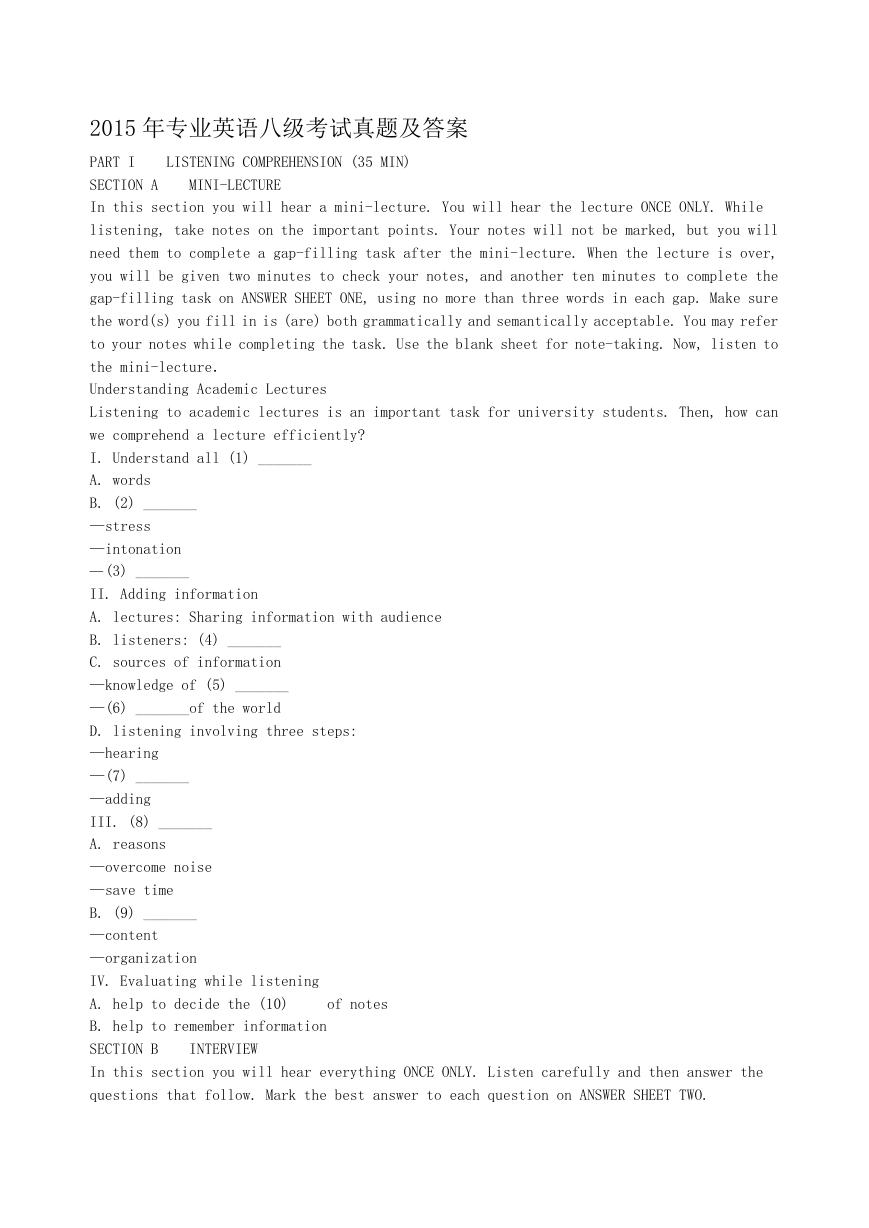
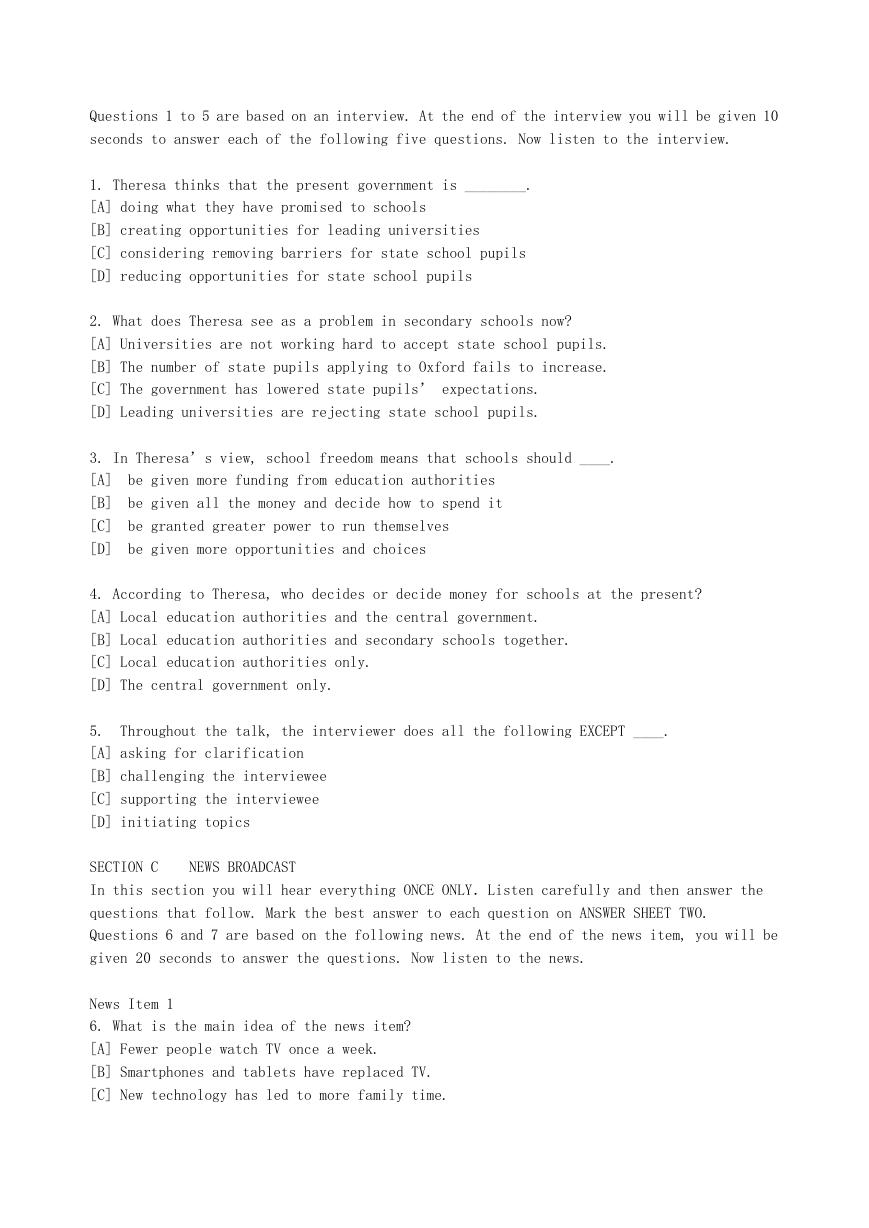
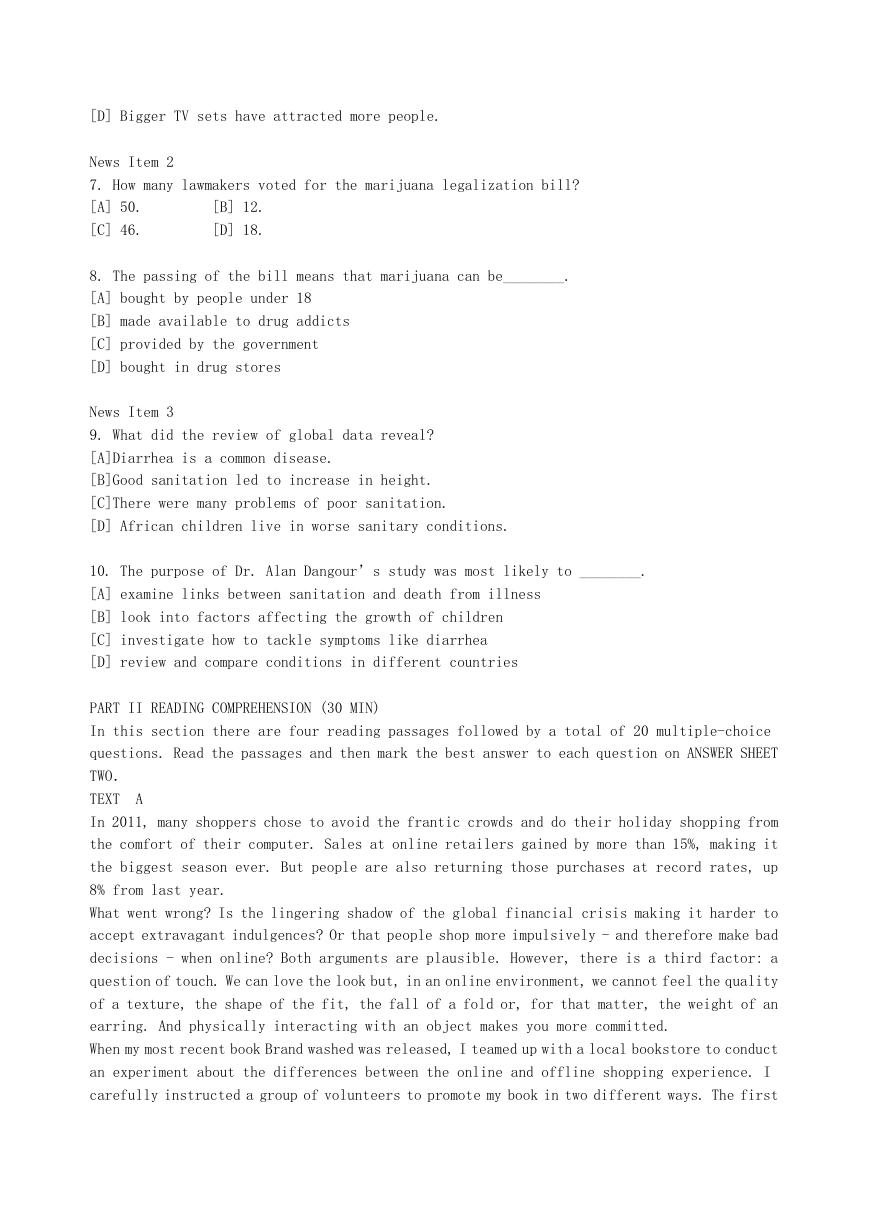
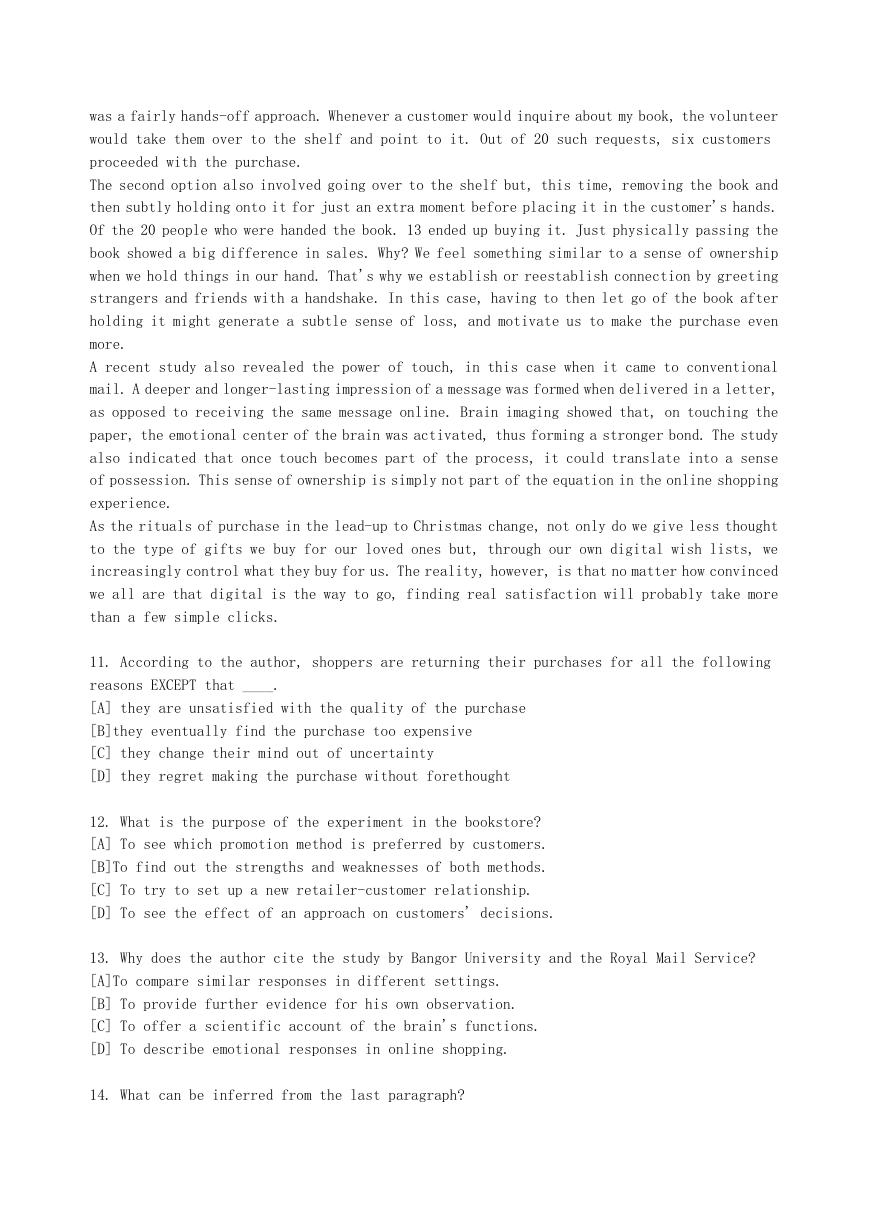
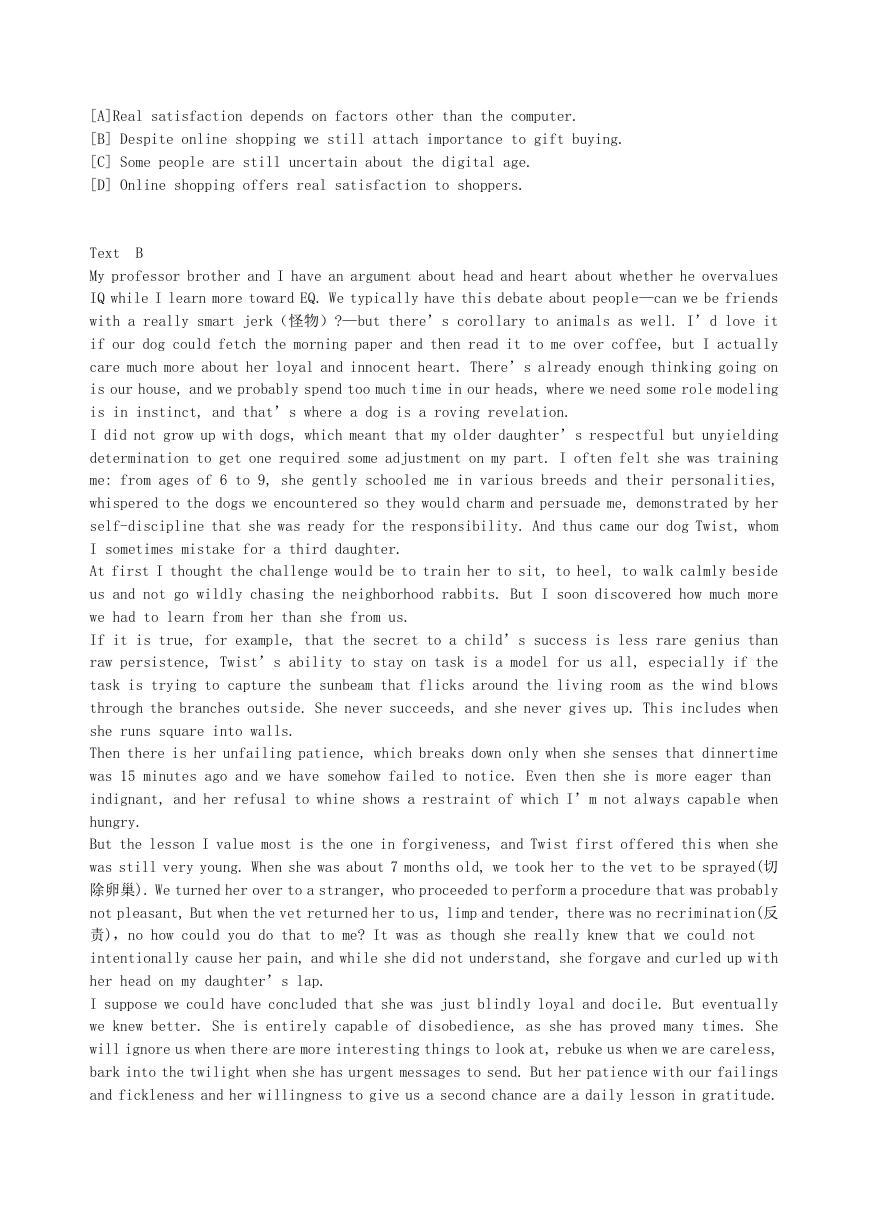
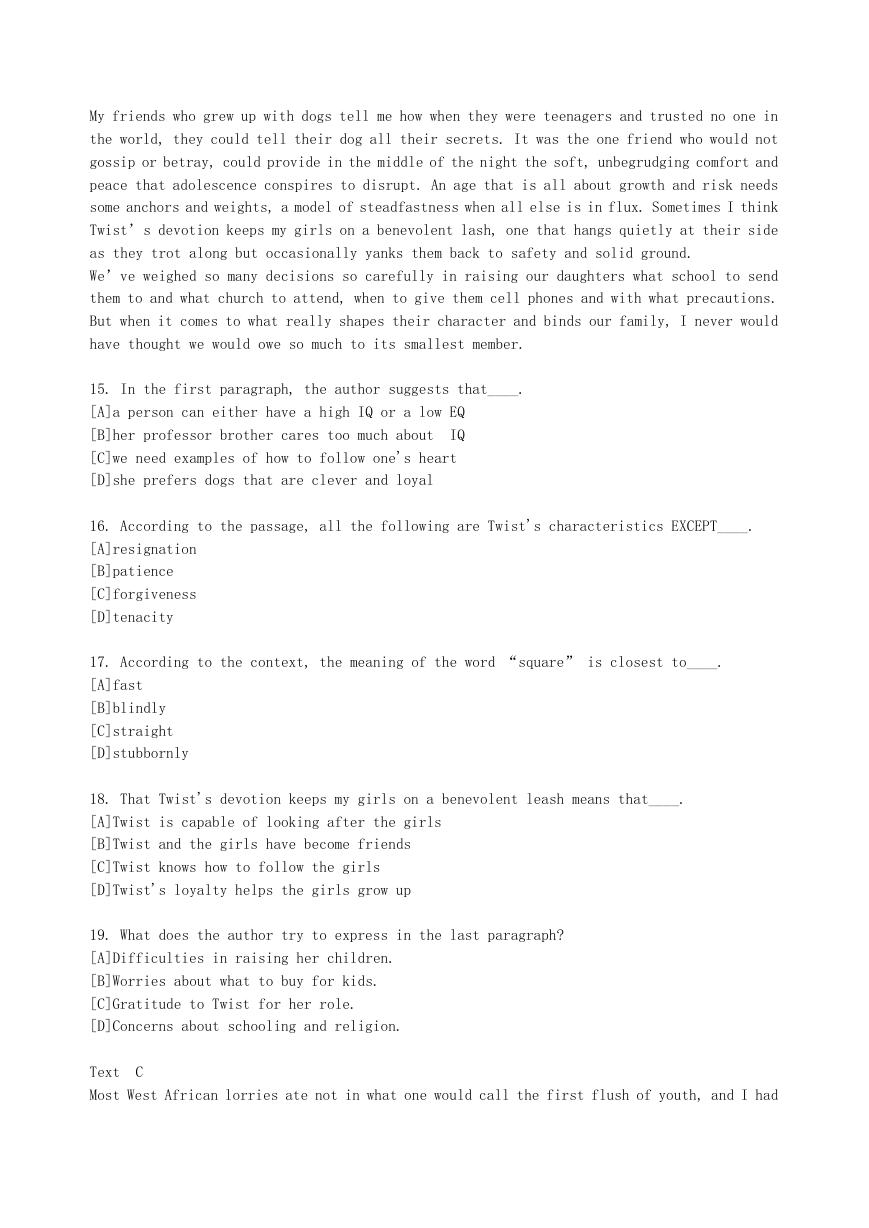
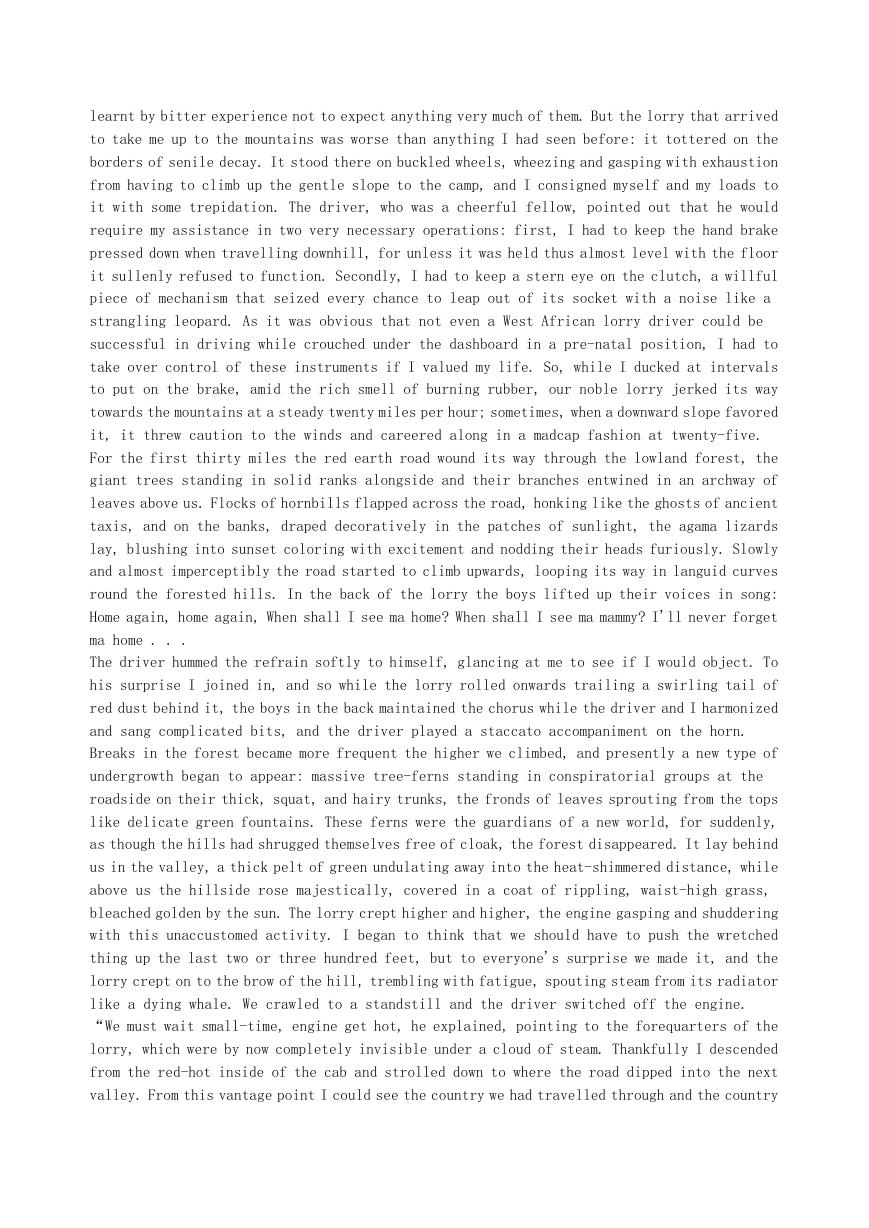
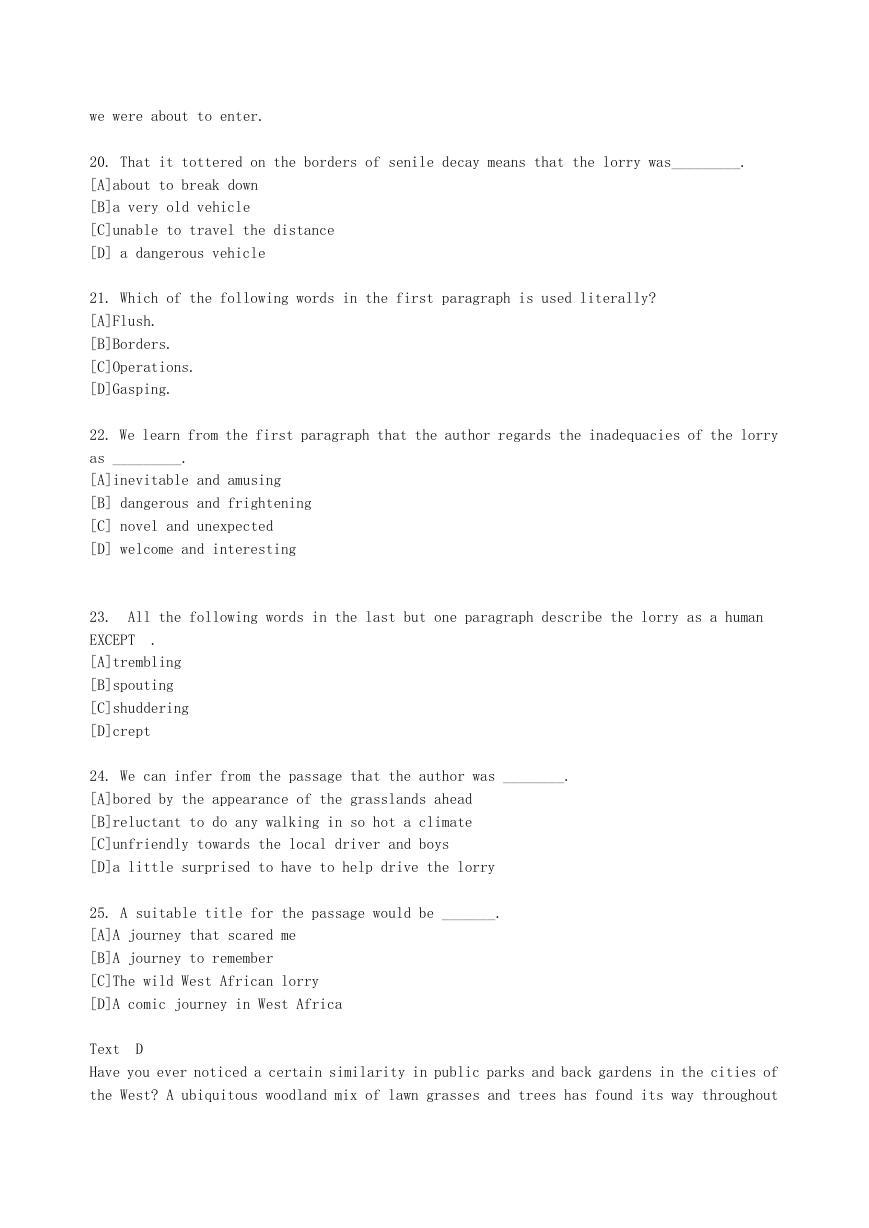








 2023年江西萍乡中考道德与法治真题及答案.doc
2023年江西萍乡中考道德与法治真题及答案.doc 2012年重庆南川中考生物真题及答案.doc
2012年重庆南川中考生物真题及答案.doc 2013年江西师范大学地理学综合及文艺理论基础考研真题.doc
2013年江西师范大学地理学综合及文艺理论基础考研真题.doc 2020年四川甘孜小升初语文真题及答案I卷.doc
2020年四川甘孜小升初语文真题及答案I卷.doc 2020年注册岩土工程师专业基础考试真题及答案.doc
2020年注册岩土工程师专业基础考试真题及答案.doc 2023-2024学年福建省厦门市九年级上学期数学月考试题及答案.doc
2023-2024学年福建省厦门市九年级上学期数学月考试题及答案.doc 2021-2022学年辽宁省沈阳市大东区九年级上学期语文期末试题及答案.doc
2021-2022学年辽宁省沈阳市大东区九年级上学期语文期末试题及答案.doc 2022-2023学年北京东城区初三第一学期物理期末试卷及答案.doc
2022-2023学年北京东城区初三第一学期物理期末试卷及答案.doc 2018上半年江西教师资格初中地理学科知识与教学能力真题及答案.doc
2018上半年江西教师资格初中地理学科知识与教学能力真题及答案.doc 2012年河北国家公务员申论考试真题及答案-省级.doc
2012年河北国家公务员申论考试真题及答案-省级.doc 2020-2021学年江苏省扬州市江都区邵樊片九年级上学期数学第一次质量检测试题及答案.doc
2020-2021学年江苏省扬州市江都区邵樊片九年级上学期数学第一次质量检测试题及答案.doc 2022下半年黑龙江教师资格证中学综合素质真题及答案.doc
2022下半年黑龙江教师资格证中学综合素质真题及答案.doc